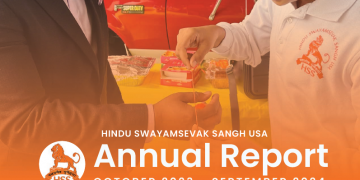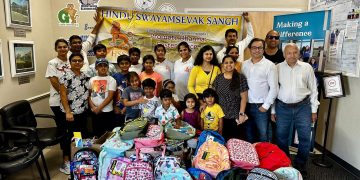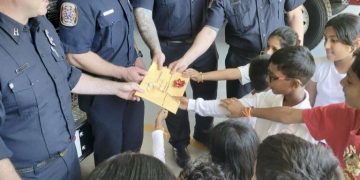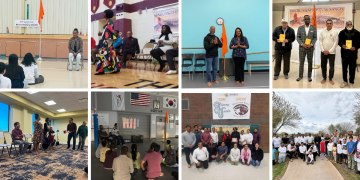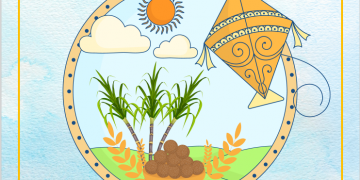Maanini – the woman of self-respect and pride – was the theme of the Hindu Women’s Conference hosted by the Hindu Swayamsevak Sangh of USA, at Ridgedale Middle School, New Jersey, on August 6th. This was in celebration of the 100th birth anniversary of Vandaneeya Lakshmibai Kelkar, popularly called Mausiji, who, in 1936, founded the Rashtra Sevika Samiti, a women’s organization, in India. Discussions centered on the multiple roles of women, Indian traditional diet, and the central role of women in changing society.
A highlight of the conference was the appearance of three grand-children of Mausiji – Sanjivani Bakare, Poornima and Shreeram Cholkar, who now live and work in New York. They were felicitated by members of the Rashtra Sevika Samiti in the United States. Sushama Londhe, who launched the website AtributetoHinduism.com, was recognized for her role in propagating a positive image of Hindu dharma.
The chief guest was Mananeeya Shanta Akka, who oversees the work of the organization around the world. In her speech she challenged women to emulate the great Hindu women who walked before them, and to get directly involved in their societies, making this world a better place than they found it.
Mananeeya Kirtida Bhatt, head of the Sevika Samiti in America, in giving an overview of the work of the group, explained that they were working together with the Hindu Swayamsevak Sangh of America, to achieve their goals and objectives.
A panel discussion with Shanta Akka, Dr Kamini Shridhar and Sushama Londhe, looked at the role of women in motherhood, professional fields and leadership for betterment of the society.
Panelists concluded that women were born with the motherhood instinct that needed to be nurtured for serving all members of society. Dr Shridhar said, the first challenge before mothers is to educate themselves on Hindu values so they could better socialize their children. Ms. Londhe felt that it was far easier bringing up her children in areas where there was a large Indian community, so the children did not feel so isolated. Shanta Akka described motherhood as inherently embracing a dedication to duty and a spirit of sacrifice. She said that today’s children in India were facing a serious identity problem, where they are inclined to see modernity as necessarily exclusive of Hindu values. She saw the education system as an important place for changing these views.
The women also discussed their various experiments with being leaders in society. Shanta Akka spoke about their work in India, in educating women to extend themselves to the wider society, and to take up seva or service projects to improve the quality of life of all citizens. Dr Shridhar reminded women that leadership does not come naturally for all women, and she described her experiments in heading projects and job related responsibilities. Kritida Bhatt explained how she helped to sensitize the male leadership in the work place to mentor women to move into higher positions. Shanta Akka reminded women that Rani Lakshmi Bai built and lead the world’s first female military regiment. She also spoke of Kusum Tai Dandekar, who migrated to the USA and was elected to political office in Iowa.
The “Disha” project, piloted by Shanta Akka in Bangalore, India, intrigued the women as a creative way to socialize the young. This project is a workshop of 12 sessions, targeting college girls from 18-23 years. Sessions focus on “know your country,” “know your dharma,” and “what can I do for my country.”
Another interesting presentation analyzed traditional Indian foods in the light of western nutrition. The presenters, Dr Seema Pathak & Savitha Patel, sought to dispel myths about the high fat and carbohydrate value in Indian foods. They touched on traditional wisdom and genetic adaptation to foods, encouraging women to continue eating their traditional foods, but in moderation. The problem today, said Pathak, is that foods are available all year round and so people cater to their taste buds, rather than eating naturally from seasonal foods.


